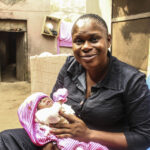Abandoned as children, women in Harare are now teaching one another to fight for their futures.
A bright pink comb is perched jauntily on Edith Kanengoni’s head. It bobs and weaves defiantly as she stirs a pot of maize porridge bubbling on an open fire, while jiggling the toddler strapped to her back to sleep.
Her three older children are playing around the fire. Kanengoni (25) is raising them in a shack on the banks of the Mukuvisi River — it coils, putrid and heavy with industrial waste and raw sewage, through the densely populated suburb of Mbare in Harare.
Nobody taught Kanengoni how to be a mother.
Her own died before she reached puberty, as did her father. Left with relatives, who beat and mistreated her, Kanengoni eventually ran away from the rural village of her birth, without much schooling and no money. She was 15 when she came to Harare — naive, if not clueless, scared and not knowing anyone.
By that time, the capital’s streets had already become home, or a source of income, to thousands of children, as Zimbabwe’s battered economy and persistent droughts plunged families into poverty and parents succumbed to Aids.
In 2007, almost one in three children in Zimbabwe — 1.6-million — had lost at least one parent and were orphaned, the United Nations Children’s Fund (Unicef) said in a statement.
A 2004 report by the Zimbabwe National Council for the Welfare of Children — in collaboration with the Harare Task Force on Children Living and/or Working on the Streets and Unicef — says an estimated 5 000 children were on the streets of Harare during this period.
Researchers found that many of these children turned to the streets because of a breakdown in the family or sexual or physical abuse, only to then be treated with scorn or once again subjected to rape or other violence. Some participated in sex in exchange for goods or protection.
Now a new generation of children is being raised on the streets by mothers who were street children themselves and are ill-equipped to be parents, explains Enias Marama, a child protection officer at the Italian humanitarian organisation Cesvi.
The nongovernmental organisation runs the House of Smiles in Harare, a drop-in centre for abandoned or orphaned children.
“These street mothers had no role models. Most of them lack basic life skills and parenting skills — knowledge we would take for granted,” says Marama. “The majority of these young mothers come from broken families, particularly if their own mothers died. When the father remarries, they are pushed out to the streets to beg.”
Marama says many young women are sexually molested as soon as they arrive on the streets. There is no one to protect them.
“You can imagine how vulnerable a girl in puberty is. She can be forced into unprotected sex by outsiders or other street children. Many then get sexually transmitted diseases or fall pregnant.”

Within two years of Kanengoni’s arrival in Harare, she had a child with a man who also lived on the street. Their son is now eight years old.
“I gave birth here because I didn’t have the money to visit a clinic,” she says, gesturing in the direction of the Mukuvisi shores where, among piles of dirty plastic containers, more makeshift shelters are knitted together against wind, rain and sun.
The baby fell ill when he was a few months old.
“[His] head started swelling and blood-like seepage started oozing from his head,” Kanengoni explains.
Not being able to a afford a doctor or hospital — and, in fact, not realising it was even an option — Kanengoni took the baby to a faith healer. The young mother trusted him, implausible as his advice would seem.
“[He] prayed and gave my son some holy water and gifted [us] stones together with prayer instructions.” This, Kanengoni believed at the time, healed her son.
She now says she was deceived. Not only is she a regular at the local clinic these days, run by Doctors Without Borders (MSF), she also encourages other street mothers to take their children there.

Kanengoni is a peer educator — one of 10 women recruited and trained by the House of Smiles to help the other street mothers get medical help and improve their parenting skills. It is part of an outreach programme to women on the Mukuvisi that has been running for about two years.
Marama explains: “They are making a big difference because the other women trust them and confide in them. Edith has become a real leader in her area.”
“Our life skills [training] start with the mothers. They will not be able to look after their children if they can’t take care of themselves,” Marama says. “A big issue is to provide them with sanitary pads — it is important to help restore their dignity.”
Women are also given sexual and reproductive health advice.
Kanengoni says she doesn’t want more children. “I discussed with my husband which family planning methods to use and had an implant as my family planning method, to which my husband agreed,” she says.
It is this confidence to assert her rights that she now imparts to the other women, many of whom are sex workers.
Sensitive matters
Rusty rail wagons in an abandoned locomotive yard in Harare is where Privilege Zvirevo (22) came as a teenager to earn a pittance. Having left school early, she had no skills.
“I was going to a disused National Railways of Zimbabwe site to work as a sex worker,” she says.
That was before she fell pregnant with her first child, Zvirevo explains. Her daughter, now six, was taken to a children’s home when Zvirevo — who claims her own mother beat her up before she fled home — couldn’t look after the child.
The girl ended up with Zvirevo’s grandmother. Her nine-month-old baby and a child of three are still in Zvirevo’s care, who says she sells sweets, beer and airtime.
Marama says it is important to empower the young women to negotiate for safer sex. “It is not an easy process. The abuser will always ‘dangle a carrot’ such as the promise of more money for sex without a condom. She is in the weaker position, so we have to empower her to insist on protection.”
The women are helped to get tested for HIV and to use antiretrovirals correctly if they test positive. The peer educators make sure street mothers also know to have their children tested for HIV if they are infected themselves.
“We tell them to immediately take their children to the clinic if they aren’t well,” Marama says. “We also work with them to get their children immunised [against childhood diseases].”
He explains: “You have to approach these matters with sensitivity. So a peer educator will explain informally that you can’t leave a sick child in a shack and go looking for your boyfriend all night if they have noticed that happening.”
If there is an outbreak of diarrhoea, for example, they will get the mothers together and tell them how to sterilise water.
“They need to be able to respond to what they see,” Marama says.
So popular has Kanengoni become that even the men in the community are seeking her confidential advice.
Kanengoni and the other peer educators are all volunteers, but get their “reward” in the higher status they enjoy in the community.
“The difference in the educators is incredible. We have seen such a tremendous change in the way they look at issues and assume authority. They now have pride and the more knowledge they get, the more they gain in confidence.”
It is not only this knowledge they are slowly imparting to the other mothers, Marama says, but also self-belief in their parenting.
Outside her shack on the river bank, Kanengoni has dished up a small bowl of maize porridge for each of her bigger children. The family is gathered around the fire. “Eat,” she smiles, and strokes the back of one of her girls. “You have to grow strong and healthy.”






